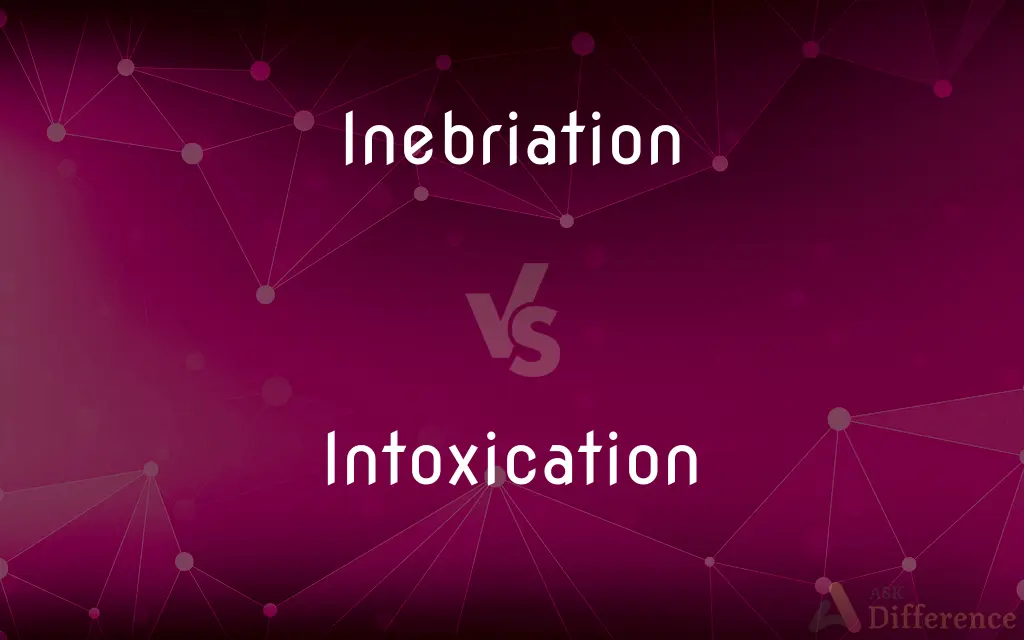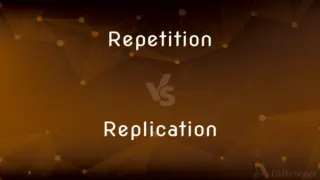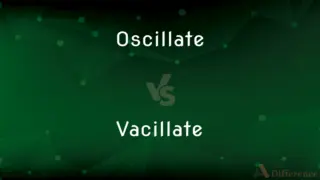Inebriation vs. Intoxication — What's the Difference?
By Fiza Rafique & Maham Liaqat — Updated on April 3, 2024
Inebriation specifically refers to drunkenness from alcohol, while intoxication can result from alcohol, drugs, or other substances.

Difference Between Inebriation and Intoxication
Table of Contents
ADVERTISEMENT
Key Differences
Inebriation is a state resulting from the consumption of alcohol, leading to impaired judgment, coordination, and altered mood. This term is often used to describe the effects of alcohol that are noticeable but not necessarily severe. On the other hand, intoxication is a broader term that encompasses not only the effects of alcohol but also those of drugs, toxins, and other substances that can alter mental state, physical function, or both.
While inebriation is exclusively associated with alcohol, intoxication can describe a wide range of conditions resulting from various substances. For example, one can be intoxicated by narcotics, prescription medications, and even substances not commonly associated with drug use, such as inhalants or certain plants. This distinction highlights the specific context of inebriation as compared to the more general and encompassing term of intoxication.
The legal implications of inebriation and intoxication can also differ. In the context of driving under the influence, for example, laws typically refer to intoxication rather than inebriation, acknowledging the wide range of substances that can impair one's ability to drive. This reflects the broader societal and legal recognition of intoxication as a state that can be induced by various means, not just by alcohol.
Furthermore, the social connotations of inebriation and intoxication can vary. Inebriation is often viewed through a narrower lens, typically associated with social drinking and its immediate, visible effects. Intoxication, however, carries a broader range of connotations, from recreational drug use to the potential for overdose and poisoning, highlighting its wider implications for health and safety.
The treatment and response to inebriation and intoxication also differ. Inebriation, being specifically related to alcohol, often requires measures to manage acute alcohol effects and prevent alcohol poisoning. In contrast, treatment for intoxication depends on the substance involved and can range from simple observation and supportive care to specific antidotes for drug overdoses or poisonings.
ADVERTISEMENT
Comparison Chart
Definition
Drunkenness specifically from alcohol.
Impairment or altered state from various substances.
Causes
Alcohol only.
Alcohol, drugs, chemicals, toxins.
Legal Context
Often related to alcohol consumption.
Broadly applies to impairment by any substance.
Social Connotation
Generally social drinking.
Can imply a range of substance use.
Treatment
Focus on managing alcohol effects.
Depends on the specific substance involved.
Compare with Definitions
Inebriation
Characterized by impaired judgment and coordination.
Inebriation made it unsafe for her to drive home.
Intoxication
Can result from a wide range of chemicals.
Accidental intoxication occurred after inhaling fumes in the lab.
Inebriation
Socially associated with parties and gatherings.
The festival is known for its atmosphere of jovial inebriation.
Intoxication
Legally defined for various levels of impairment.
He was charged with driving under intoxication.
Inebriation
Drunkenness from alcohol.
After three glasses of wine, his inebriation was evident in his slurred speech.
Intoxication
Connotes more serious health risks.
The patient was admitted for severe intoxication.
Inebriation
Result of consuming excessive alcohol.
The party led to his inebriation and a subsequent hangover.
Intoxication
Impairment from substances including drugs and alcohol.
Intoxication from the medication left her drowsy and disoriented.
Inebriation
Treated with time, hydration, and rest.
He recovered from his inebriation after a few hours of sleep.
Intoxication
Treatment varies by substance.
The hospital used specific antidotes to treat the intoxication.
Inebriation
To make drunk; intoxicate.
Intoxication
The impaired condition caused by use of alcohol or a drug or other chemical substance
Slurred speech and other signs of alcohol intoxication.
Inebriation
To exhilarate or stupefy.
Intoxication
Poisoning by a toxic substance
Spoiled silage that caused intoxication of cattle.
Inebriation
Intoxicated.
Intoxication
Exhilaration, excitement, or euphoria
The intoxication of winning a race.
Inebriation
An intoxicated person.
Intoxication
A poisoning, as by a spirituous or a narcotic substance.
He suffered acute intoxication from the combined effects of several drugs.
Inebriation
The state or characteristic of drunkenness.
Intoxication
The state of being intoxicated or drunk.
Inebriation
The condition of being inebriated; intoxication; figuratively, deprivation of sense and judgment by anything that exhilarates, as success.
Preserve him from the inebriation of prosperity.
Intoxication
The act of intoxicating or making drunk.
Inebriation
Habitual intoxication; prolonged and excessive intake of alcoholic drinks leading to a breakdown in health and an addiction to alcohol such that abrupt deprivation leads to severe withdrawal symptoms
Intoxication
(figuratively) A high excitement of mind; an elation which rises to enthusiasm, frenzy, or madness.
Inebriation
A temporary state resulting from excessive consumption of alcohol
Intoxication
A poisoning, as by a alcoholic or a narcotic substance.
Intoxication
The state of being intoxicated or drunk; inebriation; ebriety; drunkenness; the act of intoxicating or making drunk.
Intoxication
A high excitement of mind; an elation which rises to enthusiasm, frenzy, or madness.
That secret intoxication of pleasure.
Intoxication
The physiological state produced by a poison or other toxic substance
Intoxication
A temporary state resulting from excessive consumption of alcohol
Intoxication
Excitement and elation beyond the bounds of sobriety;
The intoxication of wealth and power
Common Curiosities
How do the legal implications of inebriation and intoxication differ?
Legal definitions typically use intoxication to refer to impairment from any substance, whereas inebriation specifically implies alcohol-related impairment.
What is inebriation?
Inebriation refers specifically to the state of being drunk from consuming alcohol, characterized by impaired judgment and coordination.
Can inebriation be considered a form of intoxication?
Yes, inebriation is a specific type of intoxication caused exclusively by alcohol.
What does intoxication mean?
Intoxication is a broader term that describes impairment or an altered state resulting from substances such as alcohol, drugs, toxins, or chemicals.
Can you build a tolerance to intoxication?
Yes, regular use of a substance can lead to tolerance, requiring higher amounts to achieve the same level of intoxication.
How does society view inebriation vs. intoxication?
Society often views inebriation in the context of social drinking, while intoxication can carry more serious connotations of drug abuse or poisoning.
Can intoxication be accidental?
Yes, intoxication can be accidental, especially in cases involving children, workplace exposure, or misusing prescription drugs.
How can intoxication affect mental health?
Intoxication can exacerbate mental health issues, leading to impaired judgment and risky behaviors, and can contribute to long-term psychological disorders.
Is there a safe level of inebriation?
While some may argue for moderate consumption, any level of inebriation carries risks, especially related to decision-making and physical coordination.
Can you be charged with DUI for being inebriated?
Yes, being inebriated from alcohol can lead to a DUI (Driving Under the Influence) charge, as it falls under the broader legal category of intoxication.
Are there legal limits for inebriation?
Yes, many jurisdictions set legal limits for blood alcohol concentration to define legal inebriation, especially for driving.
Is the treatment for inebriation different from intoxication?
Yes, treatment for inebriation focuses on managing the effects of alcohol, while treatment for intoxication varies depending on the substance involved.
What should you do if someone is showing signs of severe intoxication?
Seek medical attention immediately, as severe intoxication can be life-threatening.
What are the signs of inebriation?
Signs include slurred speech, impaired coordination, reduced inhibitions, and altered mood.
How long does it take to recover from intoxication?
Recovery time varies widely depending on the substance, amount consumed, and individual metabolism.
Share Your Discovery

Previous Comparison
Repetition vs. Replication
Next Comparison
Oscillate vs. VacillateAuthor Spotlight
Written by
Fiza RafiqueFiza Rafique is a skilled content writer at AskDifference.com, where she meticulously refines and enhances written pieces. Drawing from her vast editorial expertise, Fiza ensures clarity, accuracy, and precision in every article. Passionate about language, she continually seeks to elevate the quality of content for readers worldwide.
Co-written by
Maham Liaqat












































